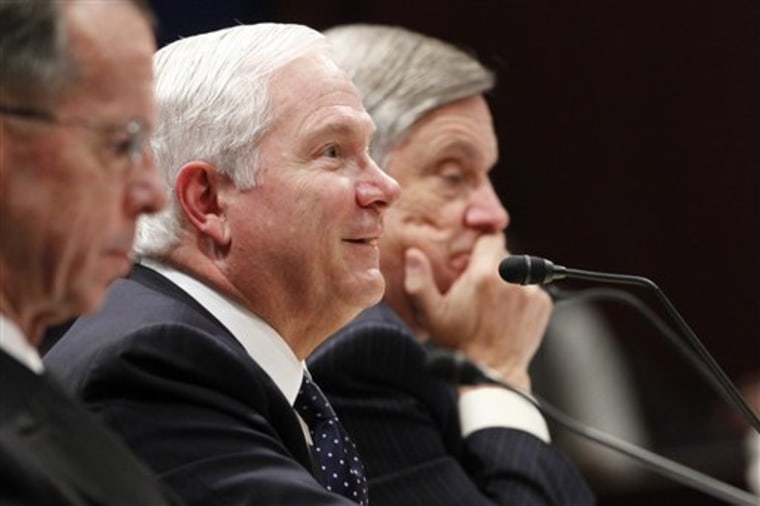Robert Gates is on a roll. Question is, how long will it last?
The politically savvy defense secretary scored big legislative wins when the Senate voted convincingly to end production of the high-priced F-22 jet fighter and killed an aircraft engine project that he says isn't needed.
Gates, a Republican holdover from the Bush administration, is on a campaign to change the way the Pentagon does business. In his sights are unnecessary or financially troubled weapons that siphon money away from the troops and gear required for irregular wars now being fought in Afghanistan and Iraq.
Yet getting Capitol Hill to go along with further deep cuts to big-ticket programs remains a huge challenge as lawmakers claw to protect the jobs these projects create in their states and districts. Others have serious disagreements with the Obama administration's strategic choices.
Case in point: House lawmakers want to spend hundreds of millions of dollars for equipment Gates doesn't want, including more than $400 million for the VH-71 presidential helicopter that the Pentagon wants canceled for being behind schedule and vastly over budget.
"It's the rarest occasion when a mature weapons system, with all the contracts and subcontracts, is terminated by the Congress of the United States," Republican Sen. John McCain, who voted in favor of killing the F-22, said recently.
Those hoping the defense budget will be purged of Cold War-style weapons look to be disappointed.
Cold war arsenal?
Iran and North Korea are perceived threats in the short run, and superpowers China and Russia still loom as potential threats over time. That means the U.S. arsenal will remain loaded with aircraft carriers, ballistic missiles, nuclear submarines, tanks and long-range bombers like the durable B-52 of Cold War-vintage.
What Gates wants is a better balance between the heavy weapons for a large-scale war and the needs of ground troops going into their ninth year of combat against unconventional foes. For too long, he and his senior advisers have argued, those pressing demands have taken a back seat.
"It would be nice to win our current wars," Michael Vickers, the Pentagon's top special operations official, said Thursday.
The grounding of the $65 billion F-22 program that played out last week was aided by special circumstances, according to defense policy analysts.
'Bigger fish to fry'
The Obama White House used substantial political capital to stop F-22 production at 187 aircraft, threatening to veto any legislation that included money for more new planes. It's unlikely such an effort will often be repeated given the stuttering economy, health care reform and other serious challenges the administration needs Capitol Hill's help with.
"They've got bigger fish to fry," said Loren Thompson of the Lexington Institute in Arlington, Va.
Lockheed Martin, the large and influential defense contractor that makes the F-22, didn't lobby to keep the production line open. That's perhaps because the company also builds the F-35, an aircraft built for ground attack missions that Gates says is better suited for the uncertainties of unconventional warfare.
The Air Force, Navy and Marine Corps plan to buy more than 2,400 F-35s.
And the Air Force's top leadership, which backed Gates on the F-22, may not be so cooperative with other moves to drop major weapons from its budget.
"It's very hard for the stars to align in a constellation that allow a hardware program to be terminated," said Gordon Adams, a former Clinton administration budget official who specializes in defense issues. "They just happened to align very nicely here."
Aside from its reputation as the world's most advanced jet fighter, the F-22 has strong backing in Congress because hundreds of companies in dozens of states are involved in its production. The most prominent are Georgia, Texas, California and Connecticut.
The Senate's decision on the F-22 isn't the final word. There's a push in the House of Representatives to buy more planes. But Rep. David Obey, chairman of the House Appropriations Committee, has indicated the fight is all but over.
"I am considerably dubious about moving forward to fund the F-22 in light of the administration's opposition to it," he said Wednesday.
Obey's committee, though, has challenged Gates' recommendations on several other projects.
Its version of the 2010 defense budget includes money for the presidential helicopter, $674 million for the Air Force's C-17 cargo jet, nine additional F-18 Super Hornet fighter jets, and $560 million for an alternative F-35 engine — a project the Senate also voted to end as Gates wanted.
The helicopter money was sought primarily by Rep. Maurice Hinchey, D-N.Y., whose congressional district includes a Lockheed Martin Corp. factory where the aircraft are being assembled.
'Can't keep spending (money)'
Lawmakers defend the moves, saying the Defense Department is being too quick to shut down programs U.S. taxpayers have invested heavily in. Close to $3.2 billion has been spent on the presidential helicopter and another $2.5 billion on the reserve engine, they say.
"You can't keep spending (money) on research and not get anything out of it," said Rep. John Murtha, D-Pa.
Gates would need at least two full terms as defense secretary to curb the influence Congress wields over the military's procurement system, said Thompson of the Lexington Institute.
"You're not going to take politics out of the way we buy weapons," Thompson said.
It may be different story inside the Pentagon, said William Nash, a retired Army general and a senior fellow at the Council on Foreign Relations in Washington.
It is significant that Gates, backed by President Barack Obama's veto threat, didn't strike a back room deal and allow a few more planes to be built to mollify F-22 proponents in Congress, he said.
Top military leaders "saw that the secretary of defense and the president of the United States, having drawn a line, stuck with it," Nash said. "That will bring a discipline, I think, into the building."
More on Robert Gates
